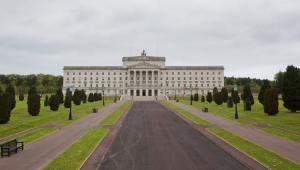The power-sharing executive was effectively frozen in September following concerns about paramilitary activity and it has also faced a fiscal crisis due to a dispute over welfare reforms.
Under the new agreement, the executive has allocated an additional £585m over four years to ‘top-up’ the UK welfare arrangements in NI with a review set for 2018/19.
This additional funding will allow the UK government’s wider welfare reforms from both the last parliament and the current Welfare Reform and Work Bill, to be introduced. These include the introduction of a household benefit cap and changed eligibility for tax credits.
The plan gives the executive additional financial support of around £500m to help it tackle “issues unique to Northern Ireland”, as well as paving the way for devolution of corporation tax powers. Under the plan, the rate will be cut from the current level of 20% to 12.5% in April 2018.
The agreement also proposes that the number of government departments in Northern Ireland be cut from 12 to 9, while arrangements will also be put in place to allow parties that do not wish to serve in the power-sharing administration to be recognised as an official opposition for the first time.
Prime Minister David Cameron hailed the deal as “an important turning point for Northern Ireland”.
“The progress we’ve achieved is testament to the commitment and hard work put in by the Northern Ireland parties, backed by [Northern Ireland secretary] Theresa Villiers and the Irish government, and I’m very pleased we’re taking this step forwards,” he said.
“What is vital now is that the parties in Northern Ireland use this agreement as the platform for stable devolved government that delivers on the day-to-day issues that matter to people.”
Northern Ireland first minister and leader of the Democratic Unionist Party Peter Robinson, who halted meetings of the Executive until there was “a satisfactory resolution” to problems, said the deal would make Stormont fit for purpose.
He highlighted that the agreement commits all parties to call for and work together to achieve the disbandment of all paramilitary organisations and their structures.
On welfare, the Executive will provide £345m for welfare top-ups and £240m for tax credit support over the next four years, while a working group will be formed to develop reforms.
“In my view this represents a sensible way forward and will ensure we have both a fair and affordable welfare system while recognising the need to help those who are also in work,” Robinson said.
Deputy first minister Martin McGuinness of Sinn Féin said the agreement was a common commitment to a better future but maintained opposition to welfare cuts.
“The cuts to our welfare budgets, tax credits and our block grant are wrong and unfair. We are determined to do all in our power to oppose this austerity and protect our people and our public services,” he stated.
“We have secured more than half a billion pounds of additional funding for the Executive plus flexibilities that can be invested in growth and public services. We are providing a package of £585m to support the most vulnerable in our society and low-income working families.”




















